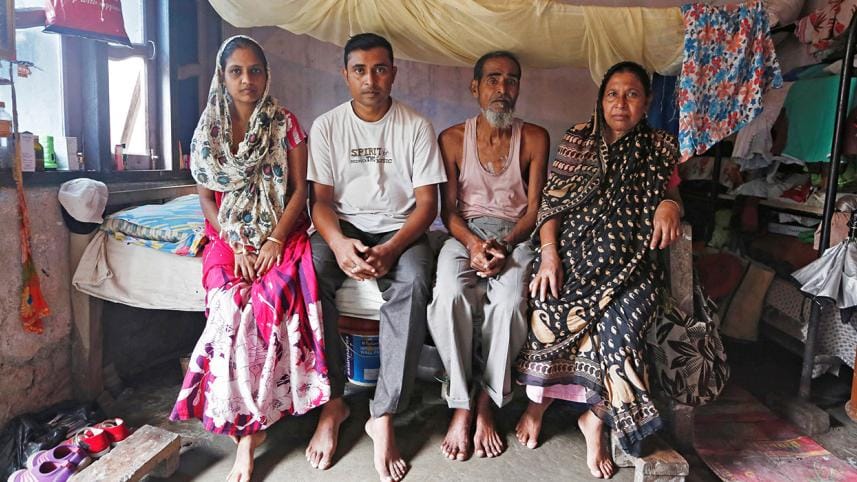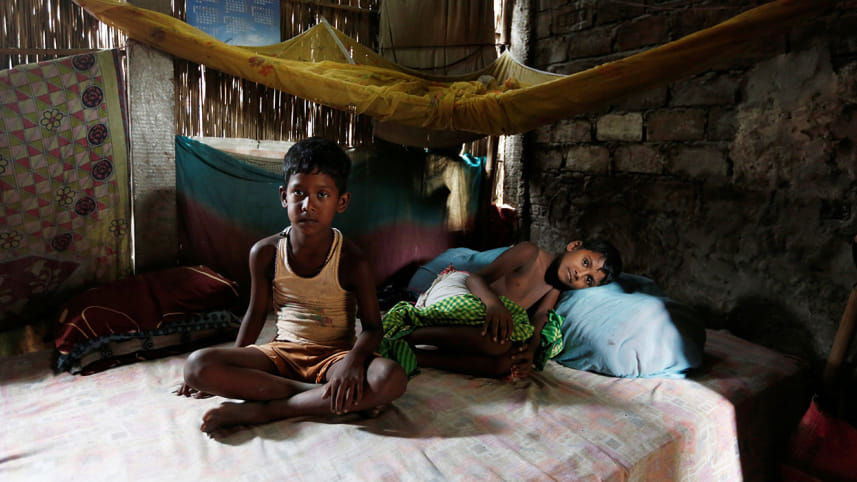In India's citizenship test, a spelling error can ruin a family

Riyazul Islam says he had to produce family documents going back to 1951 to prove he was an Indian and not an illegal Bangladeshi immigrant. But a draft list of citizens released in July excluded him and his mother, among a total of about 4 million people left off.
A wiry 33-year-old living in the northeastern state of Assam, Islam says he and his mother have no further documents left to prove they are Indians, although his father and many others in his family have been included in the National Register of Citizens (NRC).
"If my father is an Indian citizen how come I am not?" said Islam in an interview in the small Assam town of Dhubri, close to the border with Muslim-majority Bangladesh. "What more proof do they need?"
Anguish like this is now commonplace in Assam, where the Hindu nationalist government of Prime Minister Narendra Modi accelerated work on the citizen's list after coming to power in the state two years ago, promising to act against immigrants accused of stealing jobs and resources from locals.
The government has not given details of the four million excluded from the list. But most are believed to be minority Bengali-speaking Muslims living in the state, which has a total population of 33 million, mostly Assamese-speaking Hindus.
Many of those excluded are illiterate and poor, and some are victims of a spelling error in their names or a mistake in their age in documents offered for proof of citizenship, according to a review of their documents by Reuters.
Opposition parties say Modi's Bharatiya Janata Party (BJP) is denying citizenship to Muslims through the Assam list, and demonstrating its Hindu nationalist credentials with an eye on a general election due by May.
The BJP's Assam spokesman, Bijan Mahajan said there was no religion-based motive behind the citizenship drive.
"(This is) being opposed for political mileage whereas at ground zero there is absolutely no tension," he said.
However, Arun Jaitley, one of Modi's senior-most cabinet colleagues, said in a Facebook post this month that the NRC was necessary because the growth in the Hindu population of Assam had been overtaken by that of Muslims.

Ethnic Assamese have been agitating against outsiders in the state for decades. In 1983, about 2,000 people were chased down and killed by machete-armed mobs intent on hounding out Muslim immigrants. It has not been clearly established which group was behind the carnage.
The Assam NRC draft has excluded many Hindus too, but last weekend BJP chief Amit Shah assured citizenship to all non-Muslim refugees from Bangladesh, Pakistan and Afghanistan by framing a new law.
It is not clear what will happen to those excluded from the final list of citizens, due to be published by the end of the year. But lawyers say they may end up in detention camps, or at the very least be denied citizenship rights and government subsidies.
They could also be struck off voter rolls, which will be an important factor in at least half a dozen Assam constituencies in a general election.
Spelling errors
In Dhubri, a farming town on the northern bank of the Brahmaputra River upstream from the Bangladesh border, those who did not make it to the list were fearful of discussing it in public.
But inside their homes, several of those excluded showed a Reuters reporter tattered pieces of paper, including birth, school and marriage certificates dating back years and preserved carefully in plastic envelopes.
Such government-issued documents in the countryside often contain spelling or numerical errors, as the illiterate depend on others to write down details. Getting birth certificates made was also not common until recent years in many parts of the country.
Such mistakes can lead to loss of citizenship, said Aman Wadud, a lawyer who has handled dozens of cases of illegal immigration at Assam's foreigner tribunals.
"With Muslims, there is a problem of title (surnames)," said Wadud. "Because most of the accused are illiterate they don't use a constant title. Ali, Ahmed, Hussain are used interchangeably."
He showed Reuters a tribunal judgment on a resident named Tajab Ali, who submitted a series of voters lists as proof of his citizenship going back to 1966. He said his name had been wrongly recorded as Tajap Ali instead of Tajab Ali in the 1985 voters list, and his father's name wrongly recorded as Surman Ali Munshi instead of Surman Ali. There were also discrepancies in his age.
The tribunal said Ali submitted an affidavit "declaring various names of himself, his projected father, and mother. But an affidavit being only a self declaration, it has no evidentiary value."
Sajida Bibi, Islam's mother, also fell victim to a wrongly entered name.
One of the documents she submitted to prove citizenship, and shown to Reuters by the family, was an affidavit saying her name had been wrongly recorded as "Sabahan Bibi" in the 1951 citizenship registry, the first one drawn up in the state after India's independence in 1947. The affidavit also said she was named as "Sahajadi Begum" in her school certificate, and that she changed her name to "Sajida Bibi" from "Sajida Begum" after her marriage.
She swore in the affidavit that all three were the same person – her. The tribunal did not accept the affidavit.
Reuters reviewed copies of at least two other recent tribunal judgements in which people had been declared foreigners because of name and age-related errors and in which affidavits were not accepted.
"Not against Muslims"
Much of the over 2,500-mile-long border between India and Bangladesh is porous, through which hundreds of thousands of people fled from Bangladesh during its India-backed war of independence from Pakistan in 1971.
To be recognised as Indian citizens, all residents of Assam have had to produce documents proving that they or their families lived in the country before March 24, 1971.
New Delhi said in 2016 that around 20 million illegal Bangladeshi migrants were living in India. Activists who filed a petition in the Supreme Court in 2009 to expel such immigrants alleged over 4 million of them had been included in Assam's 2006 voter list.
"For 38 years, we've been fighting to protect the language, culture and identity of our indigenous people in our own motherland," said Samujjal Bhattacharya, an adviser to the All Assam Students Union (AASU), an organisation that has spearheaded the campaign against illegal immigrants.
But Bhattacharya said the NRC was not biased against any community.
"It's not against Muslims, it is not against Hindus, it is not against Bengalis," Bhattacharya said. "It's against illegal Bangladeshis. It is a question of citizens and non-citizens."



 For all latest news, follow The Daily Star's Google News channel.
For all latest news, follow The Daily Star's Google News channel.
Comments